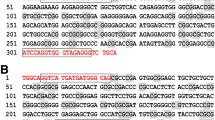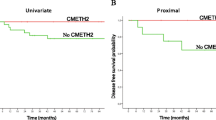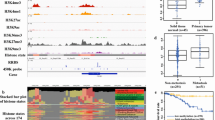Abstract
The study was aimed to investigate the relationship between hypermethylation of Syk gene and clinicopathological characteristics and long-term outcomes in colorectal cancer. The effect of Syk on cell proliferation and invasion ability was also assessed. Methylation and expression status of Syk were explored in CRC tissues and cell lines by MSP, qRT-PCR and western blot assay. The effects of Syk overexpression on tumorigenesis were studied by in vitro assay. The correlation between Syk methylation and clinical relevance in CRC patients was also analyzed. Syk methylation was found 48.6 % in CRC tissue samples and 57.1 % in cell lines, respectively. The loss of Syk expression could be restored by demethylation agent. Overexpression of Syk in CRC cell inhibited cell proliferation (p < 0.01) and invasion (p < 0.01). The methylation of Syk was significantly associated with histological grade (p = 0.002), lymph node status (p < 0.001) and TNM stage (p < 0.001). Five-year overall survival in methylated Syk group was significantly lower than that in unmethylated Syk group (59 vs. 80 %, p < 0.001). Multivariate analysis demonstrated that Syk methylation was an independent prognostic factor for overall survival. Syk is identified as a potential tumor suppressor in CRC progression. Syk methylation is correlated with poor overall survival, which acts as an independent prognostic indicator of CRC.




Similar content being viewed by others
References
Jemal A, Murray T, Ward E, Samuels A, Tiwari RC, Ghafoor A, Feuer EJ, Thun MJ. Cancer statistics. CA Cancer J Clin. 2005;55(1):10–30.
Merlo A, Herman JG, Mao L, Lee DJ, Gabrielson E, Burger PC, Baylin SB, Sidransky D. 5′ CpG island methylation is associated with transcriptional silencing of the tumour suppressor p16/CDKN2/MTS1 in human cancers. Nat Med. 1995;1(7):686–92.
1997 update of recommendations for the use of tumor markers in breast and colorectal cancer. Adopted on November 7, 1997 by the American Society of Clinical Oncology. J Clin Oncol. 1998; 16(2):793–5.
Kane MF, Loda M, Gaida GM, Lipman J, Mishra R, Goldman H, Jessup JM, Kolodner R. Methylation of the hMLH1 promoter correlates with lack of expression of hMLH1 in sporadic colon tumors and mismatch repair-defective human tumor cell lines. Cancer Res. 1997;57(5):808–11.
Veigl ML, Kasturi L, Olechnowicz J, Ma AH, Lutterbaugh JD, Periyasamy S, Li GM, Drummond J, Modrich PL, Sedwick WD, Markowitz SD. Biallelic inactivation of hMLH1 by epigenetic gene silencing, a novel mechanism causing human MSI cancers. Proc Natl Acad Sci USA. 1998;95(15):8698–702.
Shin SK, Nagasaka T, Jung BH, Matsubara N, Kim WH, Carethers JM, Boland CR, Goel A. Epigenetic and genetic alterations in Netrin-1 receptors UNC5C and DCC in human colon cancer. Gastroenterology. 2007;133(6):1849–57.
Hibi K, Mizukami H, Shirahata A, Goto T, Sakata M, Sanada Y. Aberrant methylation of the netrin-1 receptor genes UNC5C and DCC detected in advanced colorectal cancer. World J Surg. 2009;33(5):1053–7.
Flück M, Zürcher G, Andres AC, Ziemiecki A. Molecular characterization of the murine syk protein tyrosine kinase cDNA, transcripts and protein. Biochem Biophys Res Commun. 1995;213(1):273–81.
Tsuchida S, Yanagi S, Inatome R, Ding J, Hermann P, Tsujimura T, Matsui N, Yamamura H. Purification of a 72-kDa protein-tyrosine kinase from rat liver and its identification as Syk: involvement of Syk in signaling events of hepatocytes. J Biochem. 2000;127(2):321–7.
Dejmek J, Leandersson K, Manjer J, Bjartell A, Emdin SO, Vogel WF, Landberg G, Andersson T. Expression and signalling of Wnt05a/discoidin domain receptor-1 and Syk plays distinct but decisive roles in breast cancer patient survival. Clin Cancer Res. 2005;11:520–8.
Okamura S, Ng CC, Koyama K, Takei Y, Arakawa H, Monden M, Nakamura Y. Identification of seven genes regulated by wild-type p53 in a colon cancer cell line carrying a well-controlled wild-type p53 expression system. Oncol Res. 1999;11(6):281–5.
Coopman PJ, Do MT, Barth M, Bowden ET, Hayes AJ, Basyuk E, Blancato JK, Vezza PR, McLeskey SW, Mangeat PH, Mueller SC. The Syk tyrosine kinase suppresses malignant growth of human breast cancer cells. Nature. 2000;406:742–7.
Stewart Z, Pietenpol J. Syk: a new player in the field of breast cancer. Breast Cancer Res. 2001;3:5–7.
Yuan Y, Mendez R, Sahin A, Dai JL. Hypermethylation leads to silencing of the SYK gene in human breast cancer. Cancer Res. 2001;61(14):5558–61.
Wang S, Ding YB, Chen GY, Xia JG, Wu ZY. Hypermethylation of Syk gene in promoter region associated with oncogenesis and metastasis of gastric carcinoma. World J Gastroenterol. 2004;10(12):1815–8.
Muthusamy V, Duraisamy S, Bradbury CM, Hobbs C, Curley DP, Nelson B, Bosenberg M. Epigenetic silencing of novel tumor suppressors in malignant melanoma. Cancer Res. 2006;66(23):11187–93.
Ogane S, Onda T, Takano N, Yajima T, Uchiyama T, Shibahara T. Spleen tyrosine kinase as a novel candidate tumor suppressor gene for human oral squamous cell carcinoma. Int J Cancer. 2009;124(11):2651–7.
Yuan Y, Wang J, Li J, Wang L, Li M, Yang Z, Zhang C, Dai JL. Frequent epigenetic inactivation of spleen tyrosine kinase gene in human hepatocellular carcinoma. Clin Cancer Res. 2006;12(22):6687–95.
Li J, Sidell N. Growth-related oncogene produced in human breast cancer cells and regulated by Syk protein-tyrosine kinase. Int J Cancer. 2005;117(1):14–20.
Bailet O, Fenouille N, Abbe P, Robert G, Rocchi S, Gonthier N, Denoyelle C, Ticchioni M, Ortonne JP, Ballotti R, Deckert M, Tartare-Deckert S. Spleen tyrosine kinase functions as a tumor suppressor in melanoma cells by inducing senescence-like growth arrest. Cancer Res. 2009;69(7):2748–56.
Dong SW, Ma L, Xu N, Yan HQ, Liu HY, Li YW, Zhang P. Research on the reactivation of Syk expression caused by the inhibition of DNA promoter methylation in the lung cancer. Neoplasma. 2011;58(1):89–95.
Luangdilok S, Box C, Patterson L, Court W, Harrington K, Pitkin L, Rhŷs-Evans P, O-charoenrat P, Eccles S. Syk tyrosine kinase is linked to cell motility and progression in squamous cell carcinomas of the head and neck. Cancer Res. 2007;67:7907–16.
Acknowledgments
This study was supported by a grant (no. 81072042) from National Nature Scientific Funds, China.
Conflict of interest
None declared.
Author information
Authors and Affiliations
Corresponding author
Additional information
Zuli Yang and Lijun Huo contributed equally to this work.
Rights and permissions
About this article
Cite this article
Yang, Z., Huo, L., Chen, H. et al. Hypermethylation and prognostic implication of Syk gene in human colorectal cancer. Med Oncol 30, 586 (2013). https://doi.org/10.1007/s12032-013-0586-8
Received:
Accepted:
Published:
DOI: https://doi.org/10.1007/s12032-013-0586-8




